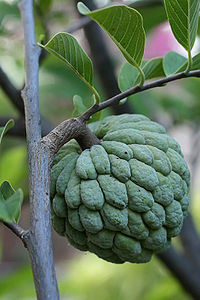
Photo from wikipedia
Due to the side effects of synthetic drugs, the interest in the beneficial role of natural products in the management of diabetic conditions is growing over time. In the context… Click to show full abstract
Due to the side effects of synthetic drugs, the interest in the beneficial role of natural products in the management of diabetic conditions is growing over time. In the context of agro-food waste products, a screening of different fruit thinning by-products identified thinned nectarines (TN) as the richest matrices of abscisic acid (ABA), a phytohormone with well-documented hypoglycemic potential. These waste-food matrices may represent not only precious sources of ABA but also other bioactive molecules with potential health benefits, such as polyphenols. Therefore, we aimed to perform a qualitative and quantitative characterization of a polyphenolic profile of a TN-based nutraceutical formulation through HPLC-HESI-MS/MS and HPLC-DAD-FLD analyses. Additionally, the in vitro antioxidant and antidiabetic potential of TN was investigated. HPLC analyses allowed us to identify forty-eight polyphenolic compounds, nineteen of which were quantified. Moreover, the results obtained through different in vitro assays showed the antioxidant and antidiabetic potential exerted by the tested nutraceutical formulation. In conclusion, the concomitant presence of different bioactive compounds in TN-based nutraceutical formulation, such as ABA and polyphenols, would reasonably support TN as an innovative nutraceutical formulation useful for the management of glucose homeostasis. Further in-depth animal-based studies and clinical trials are needed to deepen these aspects.
Journal Title: Foods
Year Published: 2022
Link to full text (if available)
Share on Social Media: Sign Up to like & get
recommendations!